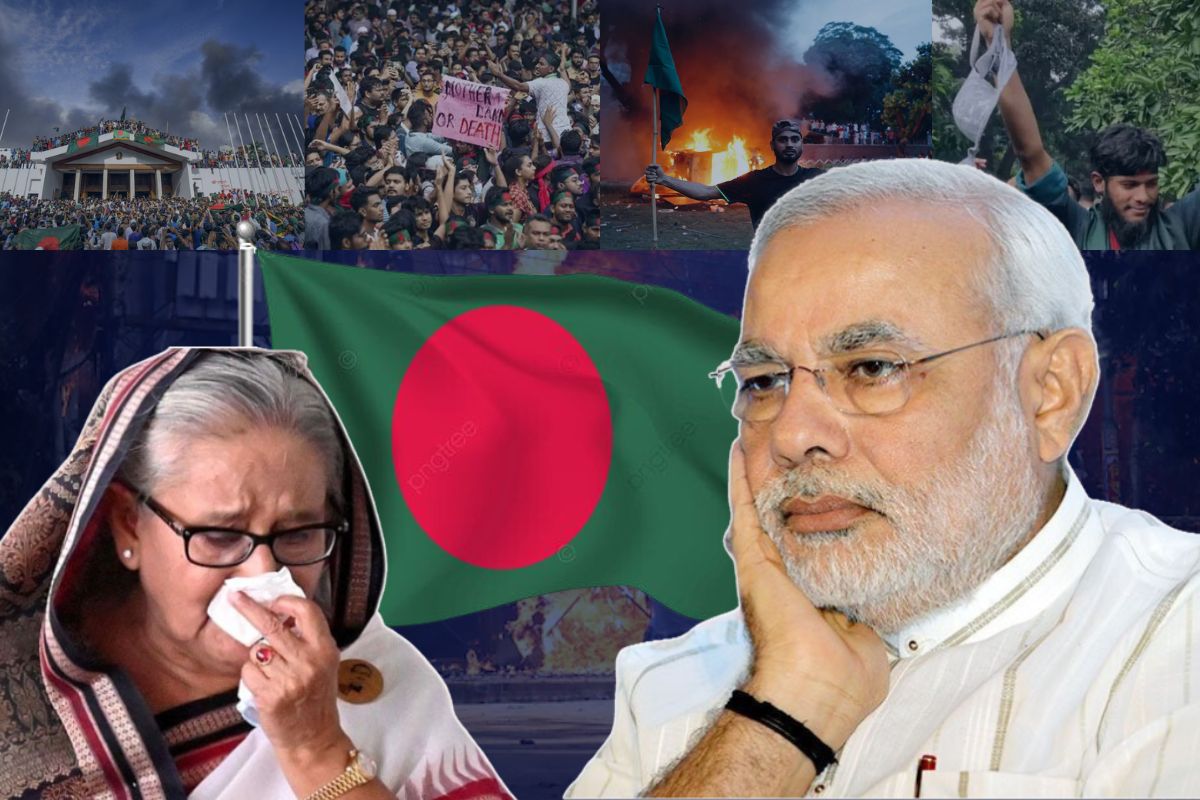As the political crisis in Bangladesh unfolds, experts and policymakers in India are reflecting on the lessons to be drawn from the turmoil and the potential implications for the region. With a shared history, cultural ties, and geographic proximity, India cannot afford to ignore the possibility of similar unrest on its soil and the influence of external powers in such a scenario.
This analytical piece explores the hypothetical situation of a “Bangladesh-like” incident in India and strategies to safeguard against external influences.
Understanding the Bangladesh Context
India is surrounded by
Bankrupt Pakistan 🇵🇰
Expansionist China 🇨🇳
Military Ruled Myanmar 🇲🇲
Undemocratic Bangladesh 🇧🇩
Politically Instable Sri Lanka 🇱🇰 & Nepal 🇳🇵Tough Times For Our Country 🙏 pic.twitter.com/FUu2tiJEu7
— Gems of Engineering (@gemsofbabus_) August 6, 2024
The recent upheaval in Bangladesh provides a critical case study. Protests erupted in 2022, sparked by controversial government policies favoring specific groups and autocratic rule. The demonstrations, primarily led by university students and later joined by broader segments of society, reflected a deep discontent with the government’s failure to address economic inequality and respect democratic norms.
The protests turned violent, with security forces using deadly force, resulting in thousands of casualties and a death toll exceeding 400, according to some reports. The army was eventually deployed, leading to the overthrow of Prime Minister Sheikh Hasina‘s government and a period of political transition. The economic fallout was significant, impacting the country’s vital garment industry and overall stability.
Assessing the Indian Scenario
While India boasts a stronger democratic foundation and a more diverse economy, it is not immune to social and economic grievances. Protests and demonstrations are a regular feature of India’s vibrant civil society, often centered around issues such as agricultural reforms, religious tensions, or responses to specific government policies.
However, the concern arises from the potential for these protests to escalate and be exploited by external powers seeking to destabilize the country or further their geopolitical interests. India’s diverse demographic and geographic landscape, coupled with ongoing challenges such as economic inequality and ethnic tensions, could provide fertile ground for discontent to grow if not addressed proactively.
Strategies for Safeguarding India’s Interests
Indian officials and analysts emphasize the importance of several key strategies to protect the country’s sovereignty and stability:
- Strengthening Democratic Institutions: India must continue to fortify its democratic foundations, ensuring free and fair elections, an independent judiciary, and respect for the rule of law. Robust democratic institutions can help channel grievances peacefully and prevent societal frustrations from boiling over.
- Addressing Grievances and Inequalities: Proactive measures to address economic and social inequalities are vital. This includes land reforms, improving access to education and healthcare, and promoting inclusive growth that benefits all regions and communities.
- Countering External Influence: India should enhance its counter-influence efforts, particularly in the information domain. Foreign interference often exploits existing societal divisions, so strengthening social cohesion and promoting unity in diversity becomes a critical defense.
- Regional Alliances and Partnerships: Building strong regional alliances, such as through the Quad (with the US, Japan, and Australia), can help India counterbalance potential adversaries and deter external powers from interfering in the region.
- Economic Resilience: Bolstering economic resilience through self-reliance initiatives and diversification of trade partners reduces vulnerabilities that external powers could exploit.
- Intelligence and Security: Robust intelligence gathering and a proactive security apparatus are essential to detect and counter potential threats, including the influence of external powers in stoking internal unrest.
Conclusion
While the likelihood of a “Bangladesh-like situation” arising in India remains low, the potential consequences are grave. By learning from the turmoil in Bangladesh, India can take proactive steps to strengthen its democratic foundations, address societal grievances, and safeguard against external powers seeking to exploit internal tensions.
As one senior Indian official remarked, “We must remain vigilant and adaptive to the evolving geopolitical landscape. Our strength lies in our unity, our democratic values, and our commitment to addressing the needs and aspirations of all Indians.”
With these strategies in mind, India can strive to protect its sovereignty, stability, and the well-being of its diverse citizenry.












